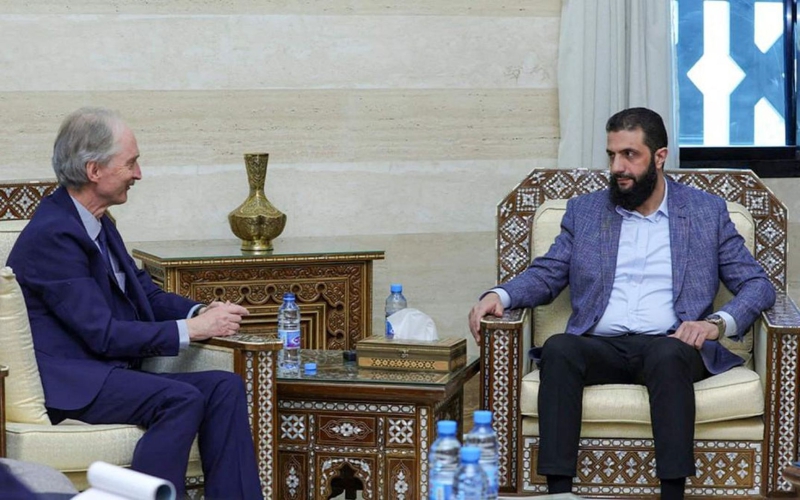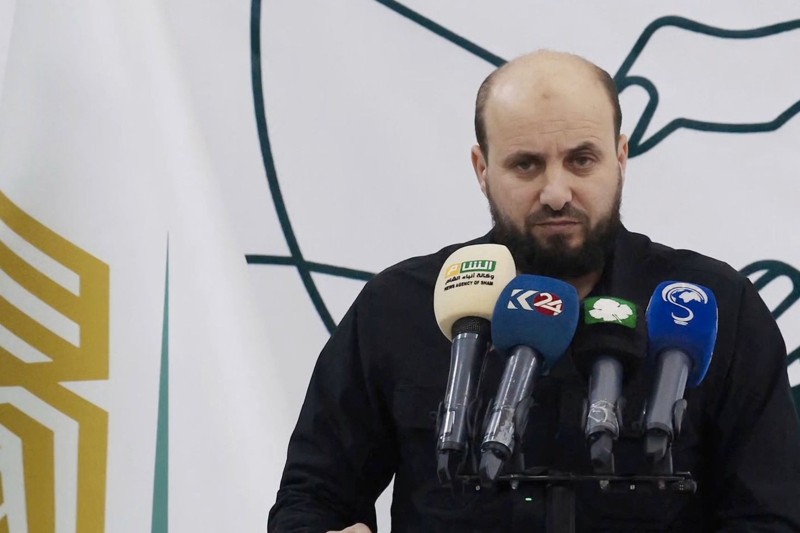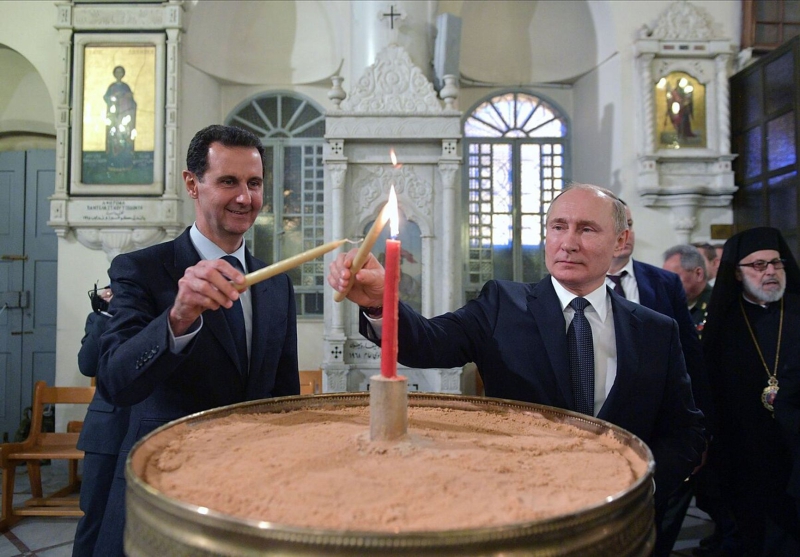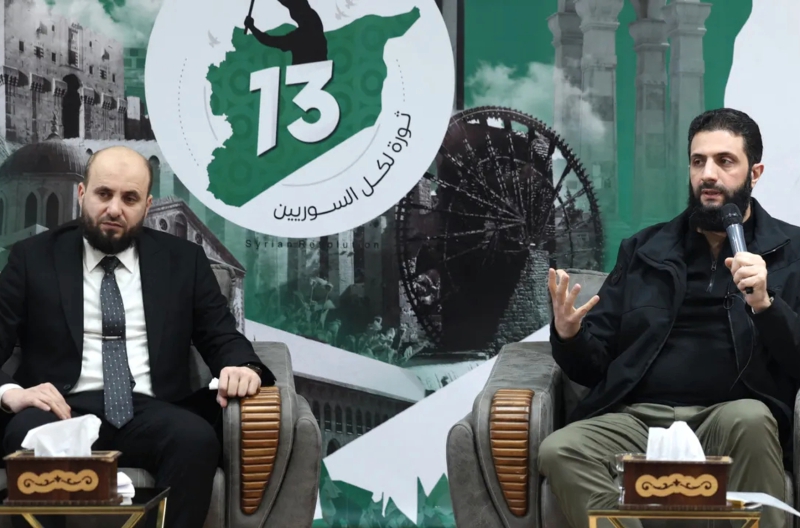Syria has ended its first ten days without Bashar al-Assad. Although the rebels who seized power do not control the entire country, they have already traded military fatigues for suits and are actively seeking international recognition. Their initial steps have included guarantees for women’s right to choose their attire and bans against persecuting journalists or settling scores with figures linked to the former regime. While the government is currently made up of a single faction, its stated goal is to launch a comprehensive national dialogue. Analysts agree that Syria’s future depends on international economic aid and the lifting of sanctions. Without these, the country risks plunging into another civil war.
On the night of Dec. 8, Syrian President Bashar al-Assad fled Damascus. By morning, the first units of anti-Assad forces had entered the capital. “The future belongs to us,” declared Ahmed al-Sharaa, leader of Hay'at Tahrir al-Sham (HTS), in a televised speech. Hours later, he personally arrived in the capital to issue directives.
“The future belongs to us,” said Ahmed al-Sharaa, leader of Hay'at Tahrir al-Sham
The new authorities’ first decrees focused on security. A curfew was imposed, and general regulations were established for the armed groups that had participated in the uprising. They were strictly forbidden from seeking revenge on rank-and-file Syrian soldiers and were directed against taking actions — such as enforcing religious behavioral norms — that might endanger civilians. Simultaneously, the new leadership pledged to bring Assad regime war criminals to justice.
Concretely, some of the first decrees issued by the Command of the Unified Armed Opposition Forces were:
- Any threats or attempts to settle scores with fellow citizens will be punished with up to one year of imprisonment. The authorities emphasize the importance of unity and of avoiding divisions that could hinder Syria’s reconstruction.
- Bread purchases are capped at four packages per person per day. This measure is intended to conserve supplies and ensure fair distribution for all citizens.
- Strict prohibitions are enacted against enforcing dress codes or appearance norms for women. The authorities declared that personal freedoms are guaranteed to all and that respecting individual rights is essential for building a civilized nation.
- Attacks or threats against employees of Syrian television, radio, and media outlets are strictly forbidden. Violators will face up to one year of imprisonment.
Hay'at Tahrir al-Sham is seeking support from both Syrians and international players. HTS is recognized as a terrorist organization not only by individual countries including the United States, but also by the UN Security Council. The group’s roots trace back to the Islamic State and Al-Qaeda. Both inside and outside Syria, memories of these organizations’ actions — and the methods they used to impose their way of life on those living in the territories they controlled — remain vivid.
In its early days, HTS differed little from its predecessors. However, HTS leader Ahmed al-Sharaa — known throughout most of the Syrian conflict as Abu Muhammad al-Julani — has proven to be both flexible and shrewd. He understood that while the path of jihad might help him seize power in Syria, it would not be enough to hold onto it. The country is fractured and devastated after 13 years of war, and enormous investments are needed in order to rebuild its infrastructure and revive its economy. Such resources can only be secured through broad international support, which requires political reforms and a commitment to national dialogue.
HTS’s most urgent task is to shed its terrorist label, and in pursuit of this aim, Al-Julani has already managed to effect a dramatic shift in his image. It was no coincidence that, even before Damascus fell, he revealed his real name, Ahmed al-Sharaa, distancing himself from his Islamist identity. Just days after assuming power, he replaced his military attire with conspicuously civilian clothing. “It’s time to build a new Syria,” he said through both word and action.

Over the past two weeks, al-Sharaa has given numerous interviews to Western and Arab media, outlining his vision for a future Syria with himself in the role of president — “but only if the citizens or those around me ask for it,” as “the form of governance in Syria will be determined by experts and legal scholars, with decisions made by the Syrian people.” Details on how the new Syrian constitution will be drafted, who will participate in the process, and how long the document will take to produce are expected to become clearer over the coming months. The transitional government has been tasked with managing the country’s affairs until Mar. 1, 2025.
Immediately after Bashar al-Assad's regime fell, Prime Minister Mohammed Ghazi al-Jalali announced his willingness to cooperate with any government chosen by the people. He remained in Damascus, along with many other cabinet members, pledging to do everything possible to preserve state institutions and ensure a peaceful transfer of power. True to his word, al-Jalali peacefully relinquished his position just two days later.
The head of the transitional government is now Mohammed al-Bashir, who had served as prime minister in the Salvation Government over the past year. Before the regime change in Damascus, this body handled administrative matters in the HTS-controlled de-escalation zone in Idlib, a city in northern Syria that remained free of government control for more than ten years.

Now the government has been handed over to people from al-Sharaa’s inner circle — this despite some initial speculation that it would be led by members of the National Coalition for Syrian Revolutionary and Opposition Forces (NCSROF), established in Doha in 2012. This organization, closely aligned with Qatar and Turkey, had participated in various international negotiations on Syria's political settlement. Unlike HTS, which is widely designated as a terrorist group, NCSROF representatives had maintained a presence in official diplomatic channels. But they and other opposition forces now find themselves sidelined despite expressing a desire to play a greater role in shaping the country’s future.
Representatives of the “official” Syrian opposition, linked to Qatar and Turkey, were excluded from the government
In the meantime, the transitional government has already begun its work, and all of its new ministers previously served in HTS’s Salvation Government. “The tasks of the interim government are to ensure security, maintain the stability of institutions, and prevent the state from collapsing. It also aims to provide basic services to the people until a new Syrian government takes office,” stated Prime Minister al-Bashir in his first official announcement. According to al-Bashir, the challenges ahead are significant, but the experience of governing Idlib should help the new ministers address urgent issues, which include ensuring that the population has access to electricity and water.
All the ministers have ties to the designated terrorist organization Hay'at Tahrir al-Sham
In the early days following the change of power in Damascus, both former Prime Minister al-Jalali and the new Prime Minister al-Bashir called on government employees to return to their posts. It was also decided to resume the work of schools and other institutions starting from Dec. 15. Concurrently, the removal of ideological content inherited from the Assad regime has become a priority for educational institutions.
Among the new government’s primary objectives is the repatriation of Syrian refugees, the majority of whom are in Turkey. It was also announced that the Syrian pound would remain the sole legal currency in the country. Additionally, the new authorities intend to restructure state media.
Statements on foreign policy and defense have primarily been made by Ahmed al-Sharaa himself, or else by Obaid Arnaut, the spokesperson for the Department of Political Affairs under the Command of Military Operations. In one of his first interviews with Arab television channels, al-Sharaa emphasized that the events in Syria marked a victory “over the dangerous Iranian project in the region.” At the same time, he clarified that the new authorities do not harbor hostility toward the Iranian people. “Our issue was with policies that harmed our country,” he said.
Al-Sharaa also stated that after the departure of Iranian forces, there is no justification for other external actors to interfere in Syria’s internal affairs. This comment primarily addressed Israel's actions, as Israel has launched hundreds of strikes on Syria in recent days targeting strategic weapons depots, air force and navy assets, air defense systems, and other sites deemed potentially threatening — including chemical weapons stockpiles.
Israel has also taken control of the entire Golan Heights region and the buffer zone between its territory and Syria. This intervention prompted the new Syrian authorities to issue their first message to the UN Security Council. The transitional government also appealed to the international community to take measures to compel Israel to cease its attacks and withdraw from the areas occupied in recent days. At the same time, al-Sharaa declared that Syria would not become a staging ground for attacks on Israel.
Al-Sharaa has promised that Syria would not become a staging ground for attacks on Israel
In the interview, al-Sharaa emphasized that Syria’s dire situation after years of war leaves no room for engaging in new conflicts that could lead to further destruction.
In line with this stance, the new leader aims to establish relations with various international players, including Russia, whose air force repeatedly bombed HTS positions in Idlib during the Syrian conflict. According to al-Sharaa, during his forces’ advance on Damascus, the rebels sought to avoid provoking Russia and “gave it the opportunity to reassess its relationship with Syria in a way that serves mutual interests.”
For now, Moscow’s primary interest is retaining its airbase at Khmeimim and its naval base in Tartus. The other hundred-or-so smaller bases and outposts in Syria are being gradually vacated by Russian forces. These are no longer needed, as Russia is no longer responsible for maintaining stability across Syrian territory. However, the bases in Tartus and Khmeimim remain vital for Moscow to sustain its presence in the Middle East and Africa.
Some Arab sources claim that all Russian forces will withdraw from Syria by the end of December, while others report that negotiations over retaining the Tartus and Khmeimim bases are proceeding positively. However, if Russia keeps its bases, the question arises as to what HTS might demand in return. To some extent, these bases could become a tool for the new Syrian authorities to exert influence over Moscow.
If Russia keeps its bases, the question arises of what HTS might demand in return
Much depends on how al-Sharaa and his government manage relations with other international players. While the global community appears open to establishing contact with HTS, it remains cautious. A joint statement released on Dece. 14 by Bahrain, the UK, Germany, Qatar, the UAE, Turkey, the U.S., France, the Arab Contact Group on Syria, the EU, and UN Special Envoy for Syria Geir Pedersen emphasized that Syrians now have an opportunity to end years of international isolation.
Pedersen visited Damascus in mid-December to meet with Syrian officials and discuss the political process's path forward. The UN envoy called for an inclusive dialogue based on UN Security Council Resolution 2254, adopted in 2015, while al-Sharaa underscored the need to update the resolution so as to make it “align with the new reality.”
The resolution supports a UN-led political process in Syria, but its timelines have long since ended. During his meeting with Pedersen, al-Sharaa stressed the importance of “caution and precision during the transitional phases and institutional rebuilding to create a strong and effective system.”
After Pedersen’s trip, other high-ranking UN officials, as well as delegations from Britain, France, and Germany, arrived in the Syrian capital, and Paris reopened its embassy in Damascus after a 12-year hiatus. Earlier, Turkey and Qatar had resumed their diplomatic missions. EU foreign policy chief Kaja Kallas announced plans to open an EU embassy in Syria. Brussels has also begun preparations for a conference on the future of the Middle Eastern country.
Brussels has begun preparations for a conference on the future of Syria
At the same time, Kallas emphasized that the EU would begin lifting sanctions on Syria only after it had observed positive steps from the country’s new authorities. The conditions for continued European engagement with HTS include “a political transition that ensures representation of all Syrian minorities, respect for human and women’s rights in Syria, and a renunciation of terrorism and extremism.” Washington holds a similar position.
The U.S. has not concealed its contacts with HTS, but America, too, remains extremely cautious. “We are leveraging all tools to closely monitor what we hope will be a peaceful transition to a stable, secure, and sovereign Syria that meets the expectations of its people,” stated John Kirby, Coordinator for Strategic Communications at the White House National Security Council, on Dec. 16.
The United States has not concealed its contacts with Hay'atTahrir al-Sham
The situation is particularly complicated for the U.S., as its military bases are located in the north and northeast of Syria. This territory is controlled by the Autonomous Administration, with the Kurds playing a leading role. The Syrian Democratic Forces (SDF), the armed groups maintaining order in this region, are Turkey's main adversary. Ankara demands that they disarm, but so long as the Kurds are under Washington's protection, they can afford to negotiate, especially since they control around 20% of Syrian territory. Unlike the Syrian army, the SDF is unlikely to surrender easily — and while they have welcomed the new authorities, they have no intention of following Turkey’s demands.
The confrontation between Turkey-aligned armed opposition forces and the SDF continues, threatening to escalate into a new civil war. At the same time, on Dec. 16 the Autonomous Administration of North and East Syria announced a 10-point initiative concerning national dialogue and called for an urgent meeting of Syrian political forces in Damascus. The document specifically addresses the issue of defense “against attacks by the Turkish state and its mercenaries.”
The key question is what position Al-Sharaa will take, as he must consider the Kurds' views if he is to credibly seek support from Western countries. At the same time, maintaining strong relations with Turkey is crucial, as Ankara aims to be the main external player in Syria.
The dilemma is not a new one. For many years, Ankara supported the armed Syrian opposition, and it was these groups that united with HTS in their march on Damascus. Unlike these factions, HTS itself has never been a Turkish proxy, although it maintained close contacts with Ankara. However, it is unlikely that Al-Sharaa wishes to alienate his allies, which is why he will likely try to maneuver between different external powers so as to avoid becoming dependent on any single one.
Al-Sharaa has made it clear that his goal is to disband all armed groups that are not loyal to the new government, saying that “there will be no weapons in the country that are not under the control of the Syrian state.” However, it is far from certain that this initiative will succeed, as has been demonstrated by the experiences of neighboring countries like Iraq and Lebanon.
For now, the new authorities are focused on deploying patrols across the country to ensure the safety of the population. At the same time, the security services that operated under the previous regime have been disbanded. Efforts to assess the state of the Syrian army are also ongoing, with many commanders from armed groups expected to be integrated into the Ministry of Defense. Officers who deserted the army after unrest began in 2011 may be allowed to return.
It is also clear that high-ranking officers loyal to Bashar al-Assad will not be part of the new army. The new authorities have announced their intention to hold accountable security service personnel and military officers “involved in torturing the Syrian people.” As al-Sharaa stated in one of his appearances on Syrian TV, “We will pursue war criminals and demand their extradition from the countries they fled to, so they can face justice.” He promised that the new authorities would soon publish its first list of high-ranking officials suspected of committing crimes against humanity. Additionally, the new authorities in Damascus intend to hold accountable all Syrian military correspondents who worked in the interests of the previous regime, while at the same time guaranteeing the safety of soldiers who served in the army due to conscription.

A separate issue involves gathering evidence of the Assad regime's crimes in order to bring the former president before the International Criminal Court. It is clear that once this process is completed, the question of extraditing Assad and his associates from their places of refuge in Russia (and elsewhere) will arise. The issue could lead to tensions between the new authorities in Syria and the powers-that-be in Moscow and similarly authoritarian capitals. However, for now, Ash-Sharaa intends to avoid conflict with anyone.
It is clear that Al-Sharaa will need to find compromises with a wide range of players both at home and abroad. Without reconciliation, there will be no lifting of sanctions and no removal of HTS's terrorist designation. But will he succeed?
The scenario of a new civil war in Syria has not been ruled out. UN experts emphasize that the situation in the country remains extremely unstable, and experts largely agree. “What happens next in Syria and the region is unknown,” states an analytical note from the research and information service of the UK Parliament. Opposition groups continue to fight for territorial control, while HTS and its allies are capturing areas — including key oil fields — recently held by the U.S.-backed SDF.
Experts are quick to point out that the Syrian opposition is far from united. Furthermore, suspicions remain about HTS's sincerity in renouncing its jihadist past. There are many questions surrounding relations with the Kurds and the Autonomous Administration. Another question is how attempts to hold former Assad regime officials accountable will play out in practice.
In neighboring Iraq, de-Baathification led many officials and military personnel from the old regime to go underground and begin fighting against the new authorities — and their Western backers. In the first days after Syria’s change of power, extrajudicial executions did take place — even if they were later condemned by the new rulers in Damascus, it is unclear if the violence is truly over. Even the threat of ISIS remains, with the group having claimed responsibility for twice as many attacks in Syria as it had the year before.
Much will depend on Turkey and the policy of the new U.S. administration. So far, Washington has stated its intention to maintain its military presence on Syrian territory and to continue the fight against the Islamic State. However, president-elect Trump may have a different opinion. At a press conference in Florida on Dec.16, he stated that Syria has “a lot of indefinites.” At the same time, Trump expressed confidence that the key to Syria lies in Turkey's hands.
The key to Syria lies in Turkey's hands, Donald Trump says
When asked about the future of the 900 remaining American troops in Syria, Trump gave an uncertain response that emphasized the strength of the Turkish military and highlighted his good relationship with that country’s leader. “Erdoğan is someone I got along with very well… He built a very strong, powerful army,” Trump said. Then, alluding to Turkey's imperial past, he added, “They wanted this for thousands of years, and they got it. The people who entered are controlled by Turkey, and that's fine.” This suggests that Washington, following Trump's inauguration, might be inclined to strike a deal with Ankara, thereby leaving the Kurds without American support.
Less than two weeks after the Assad regime’s sudden collapse, questions about Syria's future remain numerous. The new authorities have yet to shake off their terrorist label, but they are clearly seeking broad international support, declaring their readiness for political reforms and national dialogue. There have even been initial successes — albeit only in the diplomatic sphere.

